Sleep Support for People with Anxiety Disorders
😴 Introduction: When Anxiety Steals the Night
You turn off the lights and lie down, hoping to drift into sleep.
But instead of peace, your thoughts start racing: Did I say the wrong thing today? What if I can’t fall asleep again? What if something happens tomorrow?
Your heart beats faster. Your body feels restless. The clock ticks louder.
You’re caught between exhaustion and alertness — the hallmark of anxiety-related insomnia.
For people with anxiety disorders, sleep isn’t just elusive — it’s intertwined with their condition. Poor sleep worsens anxiety, and anxiety worsens sleep.
But that vicious cycle can be broken.
Through nervous system regulation, targeted supplements, and evidence-based practices, it’s possible to create real, restorative sleep — even when the mind won’t stop spinning.
This article explores how anxiety interferes with rest, and what actually helps — from science-backed nutrients to behavioral strategies that calm both brain and body. 🌿
Looking for supplements for This? Click here.
🧠 Part 1: How Anxiety Disrupts Sleep

⚡ The Biology of an Overactive Brain
Sleep requires a sense of safety. Anxiety, on the other hand, tells your brain, you’re not safe.
When anxious thoughts arise, your body activates the sympathetic nervous system — your fight-or-flight mode.
You release cortisol and adrenaline, which increase:
Heart rate ❤️
Muscle tension 💪
Alertness ⚡
All great for escaping danger — terrible for drifting off.
Even if you fall asleep, high cortisol can trigger frequent awakenings, vivid dreams, or light, unrefreshing rest.
🧩 The Anxiety–Sleep Feedback Loop
Anxiety → sleeplessness → exhaustion → increased anxiety.
This feedback loop reinforces itself through neurochemistry:
Sleep loss reduces GABA (your brain’s calming neurotransmitter).
Low GABA increases anxiety sensitivity and stress reactivity.
The more anxious you feel, the harder it is to fall or stay asleep.
In other words, anxiety disorders don’t just make you feel awake — they biochemically block the mechanisms of sleep.
🧘 Common Sleep Issues in Anxiety Disorders
People with anxiety disorders often experience:
Difficulty falling asleep (insomnia onset)
Restless or light sleep
Early morning awakenings
Nightmares or anxious dreams
Racing thoughts at bedtime
Muscle tension or jaw clenching
If this sounds familiar, you’re not alone — up to 70% of people with generalized anxiety disorder (GAD) report chronic sleep disturbances.
🌙 Part 2: The Science of Calming the Nervous System
To sleep deeply, your body must shift from sympathetic (fight-or-flight) to parasympathetic (rest-and-digest) mode.
Here’s how to encourage that shift.
🌬️ 1️⃣ The Breath–Heart Connection
Breathing is the most direct way to signal safety to your body.
Try this before bed:
The 4-7-8 Technique
Inhale 4 seconds
Hold 7 seconds
Exhale 8 seconds
This pattern slows your heart rate and activates the vagus nerve, the main pathway of the parasympathetic system.
💡 Within 3–5 cycles, your body chemistry begins to shift from stress to calm.
🧘 2️⃣ Grounding Techniques
Anxiety often pulls you into the future — grounding brings you back to the present.
Try:
Feeling the texture of your sheets
Counting your breaths
Mentally naming 5 things you can hear, 4 you can touch, 3 you can see
Grounding restores a sense of safety that allows sleep to return.
🕯️ 3️⃣ Progressive Muscle Relaxation
Start at your toes and move upward: tense each muscle group for 5 seconds, then release.
This practice discharges physical anxiety energy and helps signal the brain that the body is ready to rest.
🌿 Part 3: Nutrients and Supplements That Support Sleep and Calm
Certain nutrients help regulate neurotransmitters involved in anxiety and sleep — especially GABA, serotonin, and melatonin.
Let’s explore the most effective ones for people with anxiety-related sleep issues.
🧂 1️⃣ Magnesium Glycinate — The Nervous System Mineral
Magnesium regulates over 300 enzymatic reactions, including those that calm your nerves.
How it helps:
Reduces anxiety by stabilizing GABA receptors
Relaxes muscles and lowers heart rate
Improves sleep continuity
Dosage: 200–400 mg glycinate 1 hour before bed.
Best form: Glycinate or threonate for gentle absorption.
🌾 2️⃣ L-Theanine — Calm Without Sedation
This amino acid from green tea promotes alpha brain waves, associated with relaxation and focus.
Benefits:
Reduces racing thoughts
Enhances GABA and dopamine
Works synergistically with magnesium and melatonin
Dosage: 200–400 mg 30–60 minutes before bed.
🧘 3️⃣ GABA — The Brain’s Brake Pedal
GABA (gamma-aminobutyric acid) directly reduces neural excitability.
Why it helps anxiety:
Promotes deep relaxation
Reduces overstimulation from stress hormones
Helps you fall asleep faster
Dosage: 100–200 mg (PharmaGABA® form preferred).
🍒 4️⃣ Glycine — Cooling and Calming
Glycine lowers core body temperature, helping you transition into deeper stages of sleep.
How it helps:
Enhances sleep onset
Reduces nighttime awakenings
Promotes parasympathetic balance
Dosage: 3 g (powder in water) before bed.
🌿 5️⃣ Ashwagandha — The Adaptogenic Stabilizer
An adaptogen that helps your body adapt to stress.
Benefits:
Lowers cortisol
Improves sleep onset and duration
Reduces anxiety-related fatigue
Dosage: 300–600 mg standardized extract (Sensoril® or KSM-66®).
🧠 6️⃣ Omega-3 Fatty Acids — For Brain and Mood Regulation
Omega-3s (EPA & DHA) balance serotonin and cortisol levels.
How it helps:
Reduces inflammation linked to anxiety
Enhances serotonin receptor sensitivity
Improves sleep quality and emotional regulation
Dosage: 1000–2000 mg EPA + DHA daily.
🌺 7️⃣ Valerian and Lemon Balm — The Gentle Herbal Duo
Valerian root enhances GABA signaling, while lemon balm soothes the digestive system (often tense during anxiety).
Benefits:
Calms the nervous system
Shortens sleep latency
Improves subjective sleep quality
Dosage: 400–900 mg valerian extract + 300–600 mg lemon balm.
🍒 8️⃣ Tart Cherry Extract — Nature’s Melatonin
Tart cherries contain natural melatonin precursors and antioxidants.
How it helps:
Supports sleep onset
Reduces inflammation
Improves recovery from stress
Dosage: 480 mg extract or 8 oz juice before bed.
Looking for supplements for This? Click here.
🛏️ Part 4: Building an Anxiety-Friendly Sleep Routine
Routine provides predictability, which the anxious brain craves.
When your body learns a consistent rhythm, it stops anticipating danger at night.
Here’s how to design your nightly ritual:
🕰️ 1️⃣ Keep a Consistent Schedule
Go to bed and wake up at the same time — even on weekends.
Regularity strengthens your circadian rhythm and reduces anxiety-driven awakenings.
🌡️ 2️⃣ Create a Cool, Dark Environment
Ideal sleep temperature: 18–20°C (65–68°F).
Cool air helps regulate body temperature and lower cortisol.
Use blackout curtains and avoid LED light after sunset.
☕ 3️⃣ Avoid Stimulants Late in the Day
Caffeine and nicotine can keep cortisol elevated for hours.
Stop caffeine by 2 p.m. and swap evening coffee for herbal tea (chamomile, rooibos, lemon balm).
📵 4️⃣ Implement a Digital Sunset
Turn off screens at least one hour before bed.
Blue light suppresses melatonin and activates the visual cortex, making anxiety worse.
Use this time for journaling, stretching, or meditation instead.
✍️ 5️⃣ Journaling for Mental Offloading
Write down your worries, to-do list, or gratitude statements before bed.
This externalizes thoughts that would otherwise loop in your mind at 2 a.m.
🧘 6️⃣ Pre-Sleep Meditation
Meditation isn’t about emptying the mind — it’s about anchoring it.
Try mindfulness apps or guided audio focusing on breath and body sensations.
Studies show that even 10 minutes reduces amygdala activity (the fear center).
🌬️ Part 5: Techniques for Middle-of-the-Night Anxiety
Waking up anxious is common. When it happens:
🕯️ Step 1: Don’t Check the Clock
Time-checking activates analytical thinking and spikes cortisol.
🌙 Step 2: Stay in Dim Light
Avoid bright light exposure; it suppresses melatonin.
🫀 Step 3: Do a Body Scan
Start at your feet and work upward, releasing tension areas.
💭 Step 4: Replace Negative Thoughts
Instead of “I’ll never fall asleep,” repeat:
“My body knows how to rest. I am safe right now.”
🪶 Step 5: Use Gentle Sound
Play white noise, rain sounds, or binaural beats to calm your mind.
🧘 Part 6: Daytime Habits That Set Up Nighttime Calm
Your daytime behavior determines how anxious you’ll feel at night.
🌞 1️⃣ Morning Sunlight Exposure
Get outside within 30 minutes of waking.
This regulates your circadian rhythm, improving melatonin timing at night.
🏃 2️⃣ Move Your Body
Exercise reduces anxiety sensitivity by lowering adrenaline receptors.
Even light activities — walking, yoga, stretching — promote calmer nights.
Avoid intense workouts within 2 hours of bedtime.
🥗 3️⃣ Balanced Nutrition
Avoid skipping meals; blood sugar dips mimic anxiety symptoms.
Focus on whole foods, protein, and Omega-3s for stable energy and mood.
🚰 4️⃣ Stay Hydrated
Mild dehydration increases cortisol.
Drink throughout the day but taper fluids 1 hour before bed to avoid waking for bathroom trips.
☀️ 5️⃣ Mindful Breaks
An anxious brain benefits from micro-moments of stillness.
Take 2–3 short breaks daily to breathe, stretch, or step outside.
This conditions your nervous system to exit stress mode faster.
🌿 Part 7: When Professional Help Is Needed
If anxiety prevents you from functioning or sleeping for weeks, professional support is crucial.
🩺 1️⃣ Cognitive Behavioral Therapy for Insomnia (CBT-I)
CBT-I helps you reframe anxious thought patterns that keep you awake.
It’s one of the most effective treatments for chronic insomnia.
💬 2️⃣ Therapy for Anxiety Disorders
Talk therapy (especially CBT or acceptance-based approaches) can help regulate overactive thought loops and emotional triggers.
💊 3️⃣ Medication (When Appropriate)
For severe cases, temporary pharmacological support may be necessary — SSRIs or GABA agonists under medical supervision.
These should complement, not replace, behavioral and nutritional support.
Looking for online therapy ? Click Here.
🧩 Part 8: Sleep Stack Example for People with Anxiety
Here’s an evidence-based evening routine designed to calm anxiety and promote deep sleep:
| Time | Step | Purpose |
|---|---|---|
| 7:00 p.m. | Light dinner with protein + complex carbs | Stabilizes blood sugar |
| 8:00 p.m. | Turn off screens, dim lights | Boosts melatonin |
| 8:30 p.m. | Take magnesium glycinate (300 mg) + L-theanine (200 mg) | Calms nervous system |
| 9:00 p.m. | Warm shower + lavender aromatherapy | Activates parasympathetic tone |
| 9:15 p.m. | 10-min mindfulness or journaling | Reduces cognitive tension |
| 9:45 p.m. | Glycine (3 g) + tart cherry extract (480 mg) | Lowers body temp, promotes melatonin |
| 10:00 p.m. | Sleep | Enter deeper, more stable rest |
🌈 Part 9: Signs You’re Rebalancing
After 2–4 weeks of consistent habits and supplementation, you may notice:
✅ Faster relaxation before bed
✅ Fewer anxious thoughts in the evening
✅ Longer, deeper sleep cycles
✅ Improved morning energy and clarity
✅ Calmer baseline mood throughout the day
🌠 Conclusion: Learning to Rest in a Restless Mind
Anxiety disorders don’t mean you’re incapable of rest — they just mean your nervous system needs gentle retraining.
By supporting your brain with the right nutrients, practicing daily calm, and creating safety through routine, you can reestablish your natural rhythm of stress and recovery.
Sleep isn’t the absence of anxiety — it’s the art of allowing peace to coexist with it. 🌙
Breathe. Trust your body.
It remembers how to rest.
📚 References
Walker, M. Why We Sleep. Scribner, 2017.
Sarris, J. et al. “Nutritional and Herbal Sleep Aids.” Phytotherapy Research, 2020.
Kimura, K. et al. “L-Theanine and Stress Response Reduction.” Biological Psychology, 2007.
Peuhkuri, K. et al. “Diet and Sleep: The Role of Nutrients.” Nutrients, 2012.
Wienecke, E. et al. “Magnesium Supplementation and Sleep Quality.” J. Res. Med. Sci., 2016.
Bannai, M. et al. “Glycine Improves Subjective Sleep Quality.” Sleep and Biological Rhythms, 2012.
Langade, D. et al. “Ashwagandha Root Extract and Sleep Quality.” Cureus, 2020.
Hibbeln, J. et al. “Omega-3 Fatty Acids and Mood Regulation.” American Journal of Clinical Nutrition, 2015.
NCCIH. “Relaxation Techniques and Sleep Health.” NIH, 2023.
Huberman, A. “Tools for Sleep and Anxiety Regulation.” Huberman Lab Podcast, 2023.
Related Posts
-

How to Measure Your Emotional Growth Over Time
Emotional growth can’t be measured on a scale — but it can be tracked through awareness, regulation, and reflection. Learn how to monitor your emotional evolution using journaling, biofeedback, and science-backed metrics for real progress. 💫
-

The Connection Between Creativity and Resilience
Creativity and resilience share the same roots — adaptability, flexibility, and imagination. Learn how creative expression rewires your brain for strength, helping you transform stress into growth through neuroscience, art, and self-reflection. 🌿
-

Why Cycling Supplements May Improve Long-Term Resilience
Your body adapts to everything — even supplements. Discover why cycling your supplements helps prevent tolerance, boost energy naturally, and build lasting resilience by aligning with your body’s biological rhythms. 🌿
-

The Role of Biofeedback in Emotional Strength
Learn how biofeedback bridges mind and body — helping you monitor heart rate, breath, and brain activity to build emotional strength, resilience, and calm under pressure. See how science meets mindfulness for lasting control. 🌿
-

How to Stay Strong During Long-Term Stress
Long-term stress doesn’t just drain your energy — it rewires your biology. Discover science-backed ways to strengthen your body, balance your mind, and build lasting resilience through breathwork, nutrition, mindset shifts, and supplements that restore calm and focus. 💪
-

Resilience Training for Entrepreneurs
Entrepreneurship isn’t just about strategy — it’s about stamina. Discover how resilience training helps founders stay calm, clear-headed, and adaptable under pressure through neuroscience-backed habits, emotional regulation, and smart supplementation. 🌿
-

How Nootropics Can Boost Emotional Control
Emotions don’t have to control you. Discover how nootropics like L-theanine, ashwagandha, saffron, and omega-3s help balance brain chemistry, improve focus, and strengthen your ability to stay calm and composed under stress. 🌿
-

Stacking Adaptogens for Maximum Resilience
Adaptogens are nature’s stress shield — helping you stay calm, energized, and clear even under pressure. Learn how to stack herbs like ashwagandha, rhodiola, reishi, and schisandra for maximum resilience, balance, and long-term vitality. 🌿
-
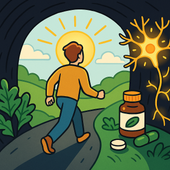
Post-Traumatic Growth and Supplements That Support It
After trauma, true healing means more than survival — it’s transformation. Learn how post-traumatic growth happens in the brain and body, and explore natural supplements like magnesium, ashwagandha, saffron, and omega-3s that support resilience, clarity, and emotional repair.
-
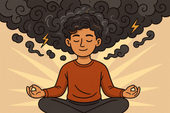
How to Regain Focus After Emotional Stress
After emotional stress, your nervous system feels frayed — your focus fades, thoughts race, and calm seems impossible. Learn how to restore balance, rebuild concentration, and retrain your brain for clarity and peace through evidence-based mind–body tools. 🌿
-
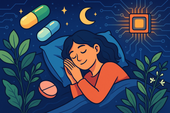
The Future of Sleep Supplements
The future of sleep supplements is here — where science meets nature. Discover how next-generation formulas use adaptogens, amino acids, and biotech innovations to support deep, restorative sleep without dependency. 🌙
-
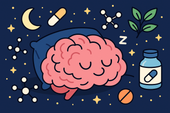
Emerging Research on Sleep and Nootropics
Can nootropics help you sleep better? Discover how compounds like L-theanine, magnesium threonate, ashwagandha, and Alpha-GPC influence neurotransmitters, circadian rhythm, and brain recovery — bridging the gap between smarter days and deeper nights. 🌙
-

New Herbal Extracts for Deep Sleep
Discover the next generation of herbal extracts for deep sleep — from saffron and magnolia to jujube and lemon balm. Learn how these plant-based compounds calm the nervous system, balance cortisol, and promote truly restorative rest. 🌙
-
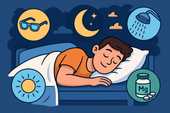
Sleep Biohacking: What Works and What Doesn’t
Biohacking your sleep can sound futuristic — from red light therapy to wearables and supplement stacks. But which hacks actually help, and which are just hype? Discover the science-backed sleep strategies that truly improve rest, recovery, and brain health. 🌙
-
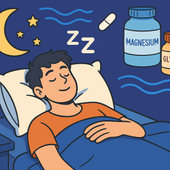
How to Fall Back Asleep After Waking Up
Waking up in the middle of the night? Learn how to fall back asleep quickly and calmly using breathing techniques, stress-reducing rituals, and natural supplements like magnesium and glycine. Restore your body’s rhythm and wake up feeling refreshed.
-
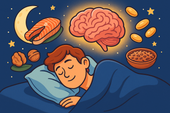
The Role of Omega-3s in Sleep Quality
-
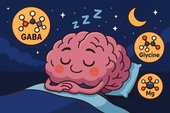
Stacking GABA and Glycine for Deeper Rest
Discover how stacking GABA and glycine can help you achieve deeper, more restorative sleep. Learn how these calming amino acids work together to relax your mind, soothe your body, and improve overall sleep quality—naturally and safely.
-

Overcoming Jet Lag with Supplements
✈️ Jet lag doesn’t have to ruin your trip! Discover how supplements like melatonin, magnesium, L-theanine, and tart cherry can help you reset your body clock faster, reduce fatigue, and recover energy naturally after long flights. 🌙
-
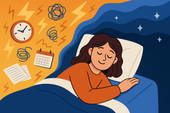
Managing Sleep During Times of Stress
Feeling wired and restless? Learn how to manage sleep during stressful times through nutrition, breathwork, and natural supplements like magnesium and L-theanine. Discover how to calm your nervous system and restore deep, peaceful rest—even when life feels overwhelming.
-

The Role of Magnesium for Night Cramps
Night cramps keeping you awake? Discover how magnesium helps relax muscles, balance electrolytes, and prevent painful spasms. Learn which forms work best, how to take them, and how to pair them with other nutrients for cramp-free, peaceful sleep.
-
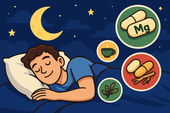
Supplements That Reduce Nighttime Awakenings
🌙 Discover science-backed supplements that help you stay asleep through the night. From magnesium and L-theanine to glycine and ashwagandha, learn how these natural compounds calm your nervous system, balance cortisol, and prevent 2 a.m. wake-ups for deeper, more restorative rest.
-

Nootropics That Promote Calm and Rest
Explore the world of calming nootropics — natural brain enhancers that promote relaxation, better focus, and deeper rest. Learn how L-Theanine, magnesium, ashwagandha, and other adaptogens help balance your nervous system, reduce stress, and support restorative sleep.
-

Best Natural Supplement Stack for Sleep
Discover the best natural supplement stack for deep, restorative sleep. Learn how nutrients like magnesium, L-theanine, glycine, and calming herbs such as chamomile and ashwagandha work together to relax your body, calm your mind, and improve sleep quality—naturally and safely.
-

Combining L-Theanine and Magnesium for Sleep: A Calm Night, Naturally
Discover how combining L-Theanine and Magnesium can help you drift into deep, restorative sleep. Learn how this natural duo calms the mind, relaxes the body, and supports your nervous system—without grogginess the next morning.
-

How to Sleep Better After Intense Workouts
Struggling to fall asleep after a tough workout? Learn how to optimize your post-training recovery with nutrition, hydration, and science-backed sleep strategies. Discover how to calm your nervous system, balance hormones, and wake up fully recharged for your next session.
-

Ashwagandha and Valerian: A Bedtime Combo for Deep Rest and Emotional Reset
Discover the calming synergy of Ashwagandha and Valerian root, two natural sleep aids that help quiet the mind, ease anxiety, and promote deeper rest. Learn how this herbal duo supports the nervous system, balances stress hormones, and restores emotional peace — without next-day grogginess.
-

How to Create a Resilience-Boosting Diet
Discover how to build emotional and physical strength from the inside out with a resilience-boosting diet 🍎. Learn which foods stabilize your mood, how supplements like magnesium and omega-3s strengthen your stress response, and why pairing nutrition with breathwork and therapy creates lasting calm, focus, and vitality 🌿💪.
-

Best Teas and Herbal Blends for Calmness: Nature’s Way to Restore Inner Peace
Ashwagandha, the ancient adaptogenic herb, helps your body find balance during stress. Known as “Indian ginseng,” it supports cortisol regulation, boosts energy, and restores calm clarity. Discover how this powerful root promotes resilience, emotional balance, and steady vitality — one cup at a time. 🌸
-

Parenting and Emotional Strength: How to Raise Children Without Losing Yourself
Empathy is the bridge that connects hearts — the quiet power to understand, feel, and support another’s emotions without judgment. Learn how empathy strengthens relationships, enhances communication, and cultivates deeper compassion in everyday life. 🌿
-

How to Bounce Back from Public Failure: Reclaiming Confidence, Purpose, and Power
Visualization is more than imagination — it’s brain training for resilience. By picturing calm, success, or healing, you activate the same neural pathways as real experience. Learn how daily visualization rewires your brain for confidence, emotional balance, and recovery from stress. ✨
-

Coping with Financial Stress Through Resilience: How to Stay Grounded When Money Feels Tight
Body awareness is the foundation of emotional resilience. By tuning into your body’s signals — tension, fatigue, or calm — you learn to recognize stress before it overwhelms you. Discover how mindfulness, gentle movement, and breathwork can deepen your connection with your body and restore balance from the inside out. 🧘
-

How to Stay Positive During Chronic Illness: A Guide to Emotional Strength and Hope
Creativity is more than art — it’s a form of healing. Whether through painting, writing, music, or small acts of expression, creativity helps release emotion, calm the nervous system, and reconnect you to joy. Discover how to use creativity as a tool for emotional balance, resilience, and self-discovery. 🌿
-

Resilience Tips for Caregivers: How to Stay Strong While Caring for Others
Joy isn’t the absence of pain — it’s the quiet strength to find light even in challenging times. Cultivating joy through small daily moments restores balance, releases stress, and reminds you of life’s beauty. Learn how to reconnect with authentic happiness, rebuild emotional energy, and nurture your nervous system through gratitude, presence, and play. 🌿
-

Building Resilience After a Breakup: How to Heal, Rebuild, and Rise Stronger
Social connection is one of the strongest predictors of emotional resilience. During difficult times, genuine relationships act as anchors — calming the nervous system, reducing stress hormones, and helping you regain perspective. Learn how cultivating real human connection can strengthen your mind, heart, and overall well-being. 🌿
-

How to Stay Emotionally Strong During Job Loss
Your emotions are powered by brain chemistry — a delicate balance of neurotransmitters like serotonin, dopamine, and cortisol. When these chemicals work in harmony, you feel calm, focused, and resilient. Learn how daily habits, nutrition, and mindfulness can support your brain chemistry and boost emotional well-being naturally. 🌿
-

The Role of Hormones in Emotional Stability: How Your Chemistry Shapes Your Calm
Hormones shape more than your body — they shape your emotions, resilience, and sense of calm. From cortisol to serotonin, these chemical messengers influence how you react to stress, connect with others, and recover from challenges. Learn how to balance your hormones naturally to build lasting emotional stability and harmony within. 💫
-

Mitochondria and Emotional Energy: The Cellular Power Behind Your Mood
Breathwork is one of the most powerful tools for emotional regulation and cellular balance. Through intentional breathing, you can calm your nervous system, increase oxygen flow to the brain, and even support mitochondrial energy. Learn how conscious breathing connects body and mind — transforming stress into presence and emotional strength. 🌿
-

Inflammation and Its Impact on Mood Resilience: The Silent Link Between Body and Mind
Inflammation doesn’t just affect the body — it impacts the mind. Chronic inflammation alters brain chemistry, depletes serotonin, and makes emotional recovery harder. Learn how calming inflammation through nutrition, mindfulness, and sleep can restore balance, resilience, and a renewed sense of emotional strength. 💫
-

How Antioxidants Protect Emotional Well-being: The Hidden Link Between Oxidative Stress and Mental Health
Antioxidants do more than protect your body — they defend your mind. By neutralizing oxidative stress, antioxidants support serotonin, dopamine, and brain energy pathways that keep you calm, focused, and emotionally balanced. Discover how foods like berries, green tea, and dark chocolate nourish your brain, boost mood, and strengthen resilience from the inside out. 🌿✨
-

The HPA Axis and Emotional Health: The Hidden Bridge Between Stress and Mind
Neuroplasticity — the brain’s ability to rewire and adapt — is the foundation of emotional healing and resilience. When you face stress, trauma, or change, your neural pathways can reshape themselves to support new patterns of calm, focus, and self-awareness. Learn how daily practices like mindfulness, therapy, and breathwork strengthen neuroplasticity to transform emotional pain into personal growth. 🌸
-

Why Cortisol Control Is Key to Resilience: Mastering Stress to Build Emotional Strength
Controlling cortisol — the body’s main stress hormone — is the secret to lasting resilience. When cortisol levels stay balanced, your mind becomes clearer, emotions steadier, and energy more sustainable. Learn how breathwork, mindset shifts, adaptogens, and daily rhythms can help you calm your stress response and build true inner strength. 🌞💪
-

Dopamine’s Influence on Motivation and Recovery: Reigniting Drive and Balance
Healthy relationships are the foundation of emotional balance and resilience. Whether romantic, familial, or platonic, genuine connection releases dopamine, serotonin, and oxytocin — the brain’s “bonding trio” — helping us feel secure, motivated, and seen. Learn how trust, empathy, and communication not only strengthen your connections but also reshape your nervous system for deeper emotional well-being. 🌿🤝
-

The Role of Serotonin in Resilience: How This “Mood Molecule” Shapes Emotional Strength
Serotonin — often called the “resilience molecule” — plays a vital role in how we handle stress, regulate mood, and recover from emotional challenges. Beyond happiness, this powerful neurotransmitter helps balance the gut-brain axis, stabilize the nervous system, and support emotional flexibility. Learn how nutrition, sunlight, mindfulness, and adaptogens can naturally boost serotonin and strengthen your emotional resilience. 🌞🧠
-

How Neuroplasticity Supports Emotional Growth: Rewiring the Brain for Resilience
Neuroplasticity is the brain’s built-in power to grow, adapt, and heal — and it’s the foundation of emotional transformation. Every mindful breath, compassionate act, or reframed thought strengthens new neural pathways that support resilience and self-awareness. Learn how your brain rewires through daily habits, helping you turn emotional challenges into opportunities for growth and calm. 🌿
-

Tai Chi and Adaptogens for Mind-Body Balance: The Art of Harmonizing Energy and Resilience
Alchemy isn’t just an ancient science — it’s a timeless symbol of transformation and inner balance. By blending the physical and spiritual, alchemy teaches us that change begins from within. Just as metals are refined into gold, we too can transmute emotional pain, stress, and chaos into clarity and strength through mindful practice and self-awareness. 🌙✨
-

Cold Therapy and Emotional Control: Training the Mind Through the Body
Cold therapy isn’t just for athletes — it’s a tool for emotional mastery. By exposing your body to controlled cold, you train your nervous system to stay calm under stress, improving focus, mood, and resilience. This article explores the science of cold exposure, its impact on hormones and the vagus nerve, and how ice baths and cold showers can help you build emotional control, one breath at a time. 🧊🧘♂️
-

How Music Influences Emotional Recovery: The Healing Soundtrack of the Mind
Neuroplasticity — the brain’s ability to rewire and heal itself — is at the heart of emotional recovery. Through mindful habits, music, therapy, and consistent mental stimulation, your brain can form new connections that support resilience and well-being. Discover how neuroplasticity turns pain into growth, helping you rebuild balance, focus, and emotional strength. 🌿
-

Nature Therapy for Building Resilience: Reconnecting With the Healing Power of the Earth
Nature therapy helps rebuild emotional resilience by reconnecting you with the healing rhythms of the Earth. From forest walks to sunlight exposure, nature restores balance to your nervous system, lowers stress hormones, and teaches emotional adaptability. Learn how spending time outdoors can enhance mental clarity, calm anxiety, and awaken your natural capacity to heal. 🌞
-

Breathwork Techniques That Pair with Supplements: The Ultimate Synergy for Stress Relief and Mental Clarity
Breathwork and supplements create a powerful mind-body synergy for stress relief, focus, and energy. By combining intentional breathing with adaptogens, nootropics, and calming nutrients, you can naturally regulate cortisol, sharpen mental clarity, and boost emotional balance. This guide explores the best breathwork techniques and supplement pairings to help you feel centered, calm, and energized from the inside out. 🌿

















































